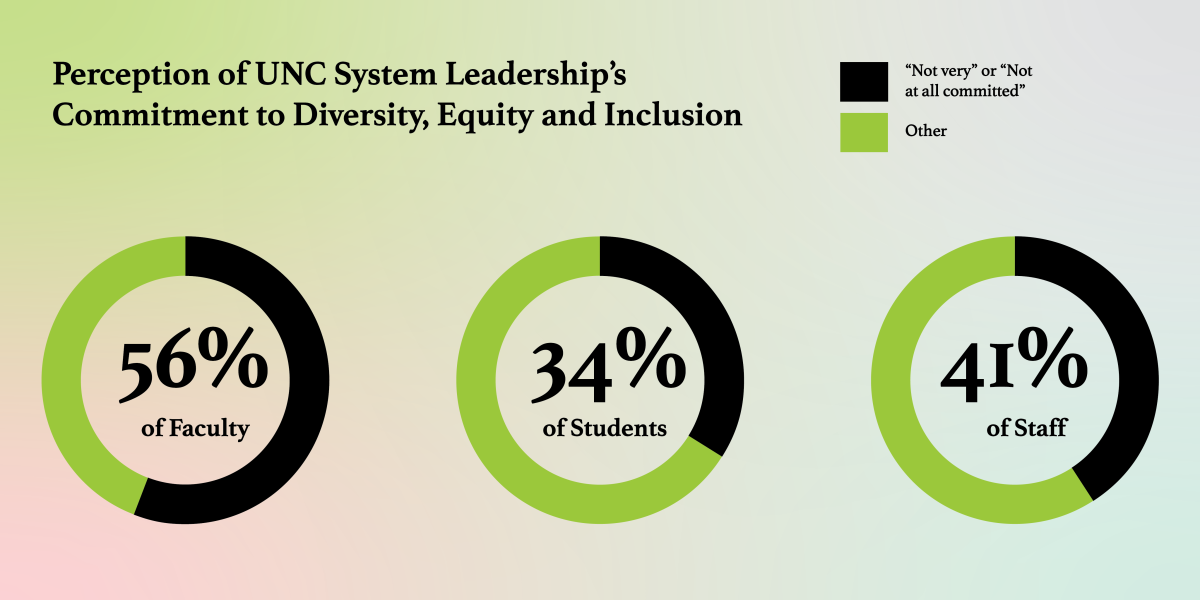The Racial Equity Task Force UNC System-wide survey found that of the total BIPOC participants, 30% of students, 44% of faculty and 38% of staff have personally experienced microaggressions, discrimination and/or harassment as a part of the UNC System, with a series of recommendations included in a final report presented to the Board of Governors on Jan. 20, 2021.
The Racial Equity Task Force was formed in summer 2020 in response to the death of George Floyd. According to Reginald Ronald Holley, the chair of the task force, the task force was formed with the purpose of exploring the history of race and racism in the UNC System and how this history has impacted the experiences of students, faculty and staff.
“These steps [of action] are considered critical to advancing racial equity throughout the UNC System and are intended to provide a pathway to implementation by the institutions and the UNC System office with support from the Board of Governors,” Holley said. “To account for the existing institutional policies and practices already in place, which vary based on institution size and other factors, action steps should be applied equitably, rather than uniformly, to ensure that institutions with a greater need and fewer resources receive priority assistance.”
According to Holley, task force members met regularly during the fall semester to examine data and consult with diversity and inclusion professionals. Holley said the task force recorded the participation of more than 20,000 students, faculty and staff after conducting a system-wide survey in September 2020 and hosting a series of virtual town halls in October 2020.
“We cannot respond to national incidents and ask people to rally around and get involved and then do nothing,” said David Green, professor of law at North Carolina Central University and former chair of the Faculty Assembly. “God forbid something happens a year or two from now, and we ask the people to come back together; they’re going to say no. They would have lost faith in the process. We have to make sure that people have faith in the process.”
Green said the UNC System Racial Equity Task Force produced a series of recommendations to move toward racial equity. The first recommendation was to create a position in the UNC System office to oversee future equity initiatives, including those mentioned in the task force’s final report.
The list of recommendations in the final report includes: diversity and equity staffing to support inclusion and belonging; representation and retention at all levels of the university; data and accountability; diversity, equity and inclusion education; programs and activities in support of racial equity and inclusion; and campus policing.
“We currently have a 19% gap between the graduation rates of white students and those of Black students,” said Anna Nelson, vice chair of the task force. “To close equity gaps such as this, it is important that we support students both in and outside of the classroom. Many students arrive on campus feeling emotionally and academically unprepared, and research shows that students of color are less likely to seek help than their white peers.”
Nelson said equitable mental health was ranked as the number one priority among student participants.
“Part of the deficiency in counseling services is that many counselors have no frame of reference for some of the trauma and issues that minorities faced in the past and continue to face in the present,” an anonymous participant said. “Many minorities are left feeling undervalued and overwhelmed and don’t know what to do or how to deal with those kinds of ongoing psychological trauma.”
The final report also stated that 1 in 5 BIPOC students, faculty and staff do not feel that they are part of a community on campus.
“We risk bringing minorities into spaces that are not prepared to support and accept them,” an anonymous student participant said. “It seems to me that we need to first focus on purging our environments of discriminatory tendencies and unchecked racism. That way, we don’t usher our fellow BIPOC into spaces that are going to be harmful to them.”
BIPOC students, faculty and staff indicated a clear lack of trust in police. Among all student participants, “offering alternatives” and “evaluating campus police practices” both ranked in the top five priorities for students. Participants highlighted a lack of confidence in current reporting structures within their institution as well, with 45% of BIPOC students, 53% of faculty and 48% of staff answering that they are not confident offenders will be held accountable.
“Several things that we found during the course of both the surveys and the town halls is that institutions should offer some form of diversity and equity sensitivity training, covering not just a general category, but numerous other areas such as racial bias, implicit bias and diversity and inclusiveness for all employees of the UNC System and our student body,” said Dr. Timothy Ives, professor of pharmacy at UNC-Chapel Hill and chair of the Faculty Assembly. “[T]here is no uniform cultural sensitivity or diversity training program that is available across the entire system.”
“We’re living through a time of deep distrust in organizations of all kinds, from churches to companies to colleges,” said Peter Hans, president of the UNC System. “There’s a lot of skepticism about whether big institutions can be allies in the fight for a better and fairer world. I promise you, this one can be and will be.”
The full final report can be viewed at the UNC System website.








